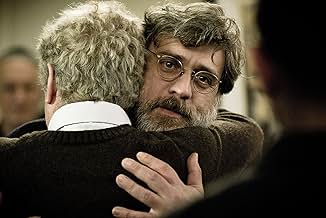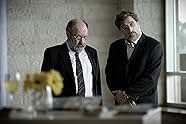Aggiungi una trama nella tua linguaEliezer and Uriel Shkolnik are father and son as well as rival professors in Talmudic Studies. When both men learn that Eliezer will be lauded for his work, their complicated relationship re... Leggi tuttoEliezer and Uriel Shkolnik are father and son as well as rival professors in Talmudic Studies. When both men learn that Eliezer will be lauded for his work, their complicated relationship reaches a new peak.Eliezer and Uriel Shkolnik are father and son as well as rival professors in Talmudic Studies. When both men learn that Eliezer will be lauded for his work, their complicated relationship reaches a new peak.
- Regia
- Sceneggiatura
- Star
- Candidato a 1 Oscar
- 14 vittorie e 9 candidature totali
- Eliezer Shkolnik
- (as Shlomo Bar Aba)
- Yehudit Shkolnik
- (as Alisa Rosen)
- Dikla Shkolnik
- (as Alma Zak)
- Committee Member
- (as Shmulik Shilo)
- Committee Member
- (as Albert Illouz)
- TV Host
- (as Jacky Levy)
Trama
Lo sapevi?
- QuizJoseph Cedar is the son of the Israel Prize recipient, Haim Cedar.
- BlooperAt around 38:00, when Uriel enters the room that the committee is meeting in for the first time, he can open and close the door easily. But when he returns with a chair a few seconds later, suddenly there's not enough space to close it, despite his chair not being in the way.
- Citazioni
Uriel Shkolnik: [to a student] I will tell you something that my father told me once: Your work has many things correct and many things innovative. Unfortunately, the innovative things are not correct and the correct things are not innovative.
- Curiosità sui creditiThe credits for the major cast and crew members all have the initial letters of their names in bold, echoing the plot device that causes the confusion between the father and son.
- ConnessioniFeatured in At the Movies: Cannes Film Festival 2011 (2011)
The film centers on Eliezer Shkolnik (Schlomo Bar Aba), an aging Talmudic scholar and philologist, who has become a bitter and aggrieved man after having been passed over for the prestigious Israel Prize for twenty years. Eliezer arrogantly denounces the selection committee for the Prize as people who have forgotten the meaning of true scholarship. He has spent his career researching corrupted Jewish texts that deviate from the original Talmud, but whose only recognition has been a citation in a footnote.
Ill at ease in the hallowed walls of academia and in relationships in general, Eliezer sleeps in his office and only ventures out to go to the library. He continues to schedule classes even though as little as one or two people enroll. His relationship with his wife Yehudit (Alisa Rosen) appears strained and distant and, when he is at home, he blocks out the world by putting on gigantic yellow earphones. His behavior is contrasted with that of his more sociable and outgoing son, the bearded Uriel (Lior Ashkenazi) who is also a Talmudic scholar but one whose work is more attuned to popular tastes. His father, unfortunately, is generally disdainful, calling him a "folklorist" and a scholar subservient to the prevailing academic status quo.
The film opens with Eliezer sitting in an auditorium with a dour and rigid look on his face as Uriel is being inducted into a scholarly academy, an honor which the father has never received. Despite the downbeat beginning, the first part of the film is fairly lighthearted with Cedar entertaining us with inter-titles describing the background of the characters and Amelie-like cutesy cinematic tricks bouncily scored by Amit Poznansky. Halfway through, however, the film takes a more dramatic turn when Eliezer learns that he has finally won the Israel Prize after waiting for twenty years, an event that threatens the resentment he clings to so obsessively.
Unfortunately, a ridiculous faux-pas by the Nominating Committee only serves to place more obstacles in the father-son relationship. It is, unfortunately, not an easily correctable mistake but a true ethical dilemma and one that precipitates a confrontation between Uriel and the academic committee in a tiny room, an absurd scenario that would be funny if it did not have so many potential disastrous ramifications. The brunt of Uriel's attack is directed towards Yehuda Grossman (Michah Lewesohn), a scholar who has either rejected or ignored his father's work and whose publication of his own Talmudic discovery undermined all the meticulous research Eliezer had been doing for years. In the film's most dramatic sequence, the confrontation escalates into highly articulated personal attacks, ultimatums, and even a bit of physical violence.
While Uriel is defending his father at the committee meeting, Eliezer is doing the opposite, criticizing his son during an interview, lumping him in with those whose Talmudic studies he considers to be shallow and superficial. Needless to say, this even further exacerbates their troubled relationship. Footnote is an engaging film marked by exceptional performances by Lewesohn, Ashkenazi, and Bar Aba and you can enjoy it whether or not you care very much whether or not the current version of the Talmud correctly reflects the original ancient texts. The depiction of Eliezer, however, is one-dimensional and the father's incessant self-righteousness turns the film into a sour and mostly unpleasant affair. In addition to its depressing tone, numerous plot points are introduced and then dropped without further comment.
Eliezer is seen talking to another woman, a sequence that leads to a bedroom discussion of the event between Uriel and his wife Dikla (Alma Zack), but soon morphs into an argument, its purpose obscure. Also in another thread that goes nowhere except to add to the general unpleasantness, Uriel's son Josh (Daniel Markovich) goes on a hiking trip and comes home having to confront his father's anger at his ostensible lack of ambition or goals. Although the film's loose ends are particularly annoying, we are caught up in its very compelling scenario. Cedar knows how to build up the tension and we eagerly await some sort of resolution but, as is the trend of late, the director feels that his film is more valuable as a gigantic set-up than as a satisfying resolution and the result is a film that leaves us thinking that the projectionist inadvertently cut out the best part of the movie.
- howard.schumann
- 31 mar 2012
- Permalink
I più visti
- How long is Footnote?Powered by Alexa
Dettagli
Botteghino
- Lordo Stati Uniti e Canada
- 2.007.758 USD
- Fine settimana di apertura Stati Uniti e Canada
- 47.528 USD
- 11 mar 2012
- Lordo in tutto il mondo
- 2.451.259 USD
- Tempo di esecuzione1 ora 47 minuti
- Colore
- Mix di suoni
- Proporzioni
- 2.35 : 1
Contribuisci a questa pagina





































